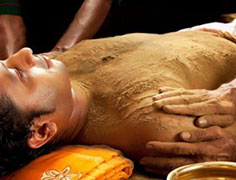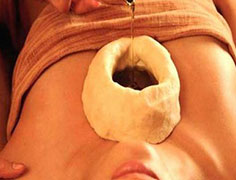Ayurveda works on the belief earth, water, fire, air and space make up the universe and that health and wellness depend on a delicate balance between the mind, body, and spirit. Good health is achieved when your mind, body, and spirit are in harmony with the universe. The primary focus of Ayurvedic medicine is to promote good health, rather than fight disease.
Anything that affects your physical, spiritual, or emotional well-being can cause you to be out of balance with the universe. Some things that can cause a disruption include:
Genetic or birth defects, Injuries, Climate and seasonal changes, Age and Emotions
How your body works to keep you healthy and your unique physical and psychological characteristics combine to form your body's constitution, or prakriti. Your prakriti is believed to stay the same for your entire life. However, how you digest food and eliminate waste can influence it.
Every person is made of a combination of five basic elements found in the universe:
Space, Air, Fire, Water and Earth
These elements combine in the human body to form three life forces or energies, called doshas. They control how your body works. The three doshas are:
VATA
The Vata dosha is the most important of the three doshas. In the classic Ayurveda books it is quoted that other doshas are lame without the help of vata. The elements combine with Ether and Air in dominance to form what is known in Ayurveda as Vata Dosha Vata dominates the lower part of the body, which is below umbilicus. The movements of body fluid, metabolism, elimination of waste products, relaying stimulus to brain and response to organs and tissues, heart beat, respiration, body movements etc are assisted by VATA. Vata dominated regions are intestines, lumbar region, ears, bones and skin.
PITTA
The elements with Fire and Water in dominence combine to form the Pitta Dosha . The Pitta Dosha is responsible for the process of transformation or metabolism. The transformation of foods into nutrients that our bodies can assimilate is an example of a Pitta function. Pitta is also responsible for metabolism in the organ and tissue systems as well as cellular metabolism.
KAPHA
Finally, it is predominantly the water and earth elements, which combine to form the Kapha Dosha. Kapha is responsible for growth, adding structure unit by unit. It also offers protection, for example, in form of the cerebral-spinal fluid, which protects the brain and spinal column. The mucosal lining of the stomach is another example of the function of Kapha Dosha protecting the tissues.
When the three Doshas are well harmonised and function in a balanced manner, it results in good nourishment and well-being of the individual. But when there is imbalance or disharmony within or between them, it will result in elemental imbalance, leading to various kinds of ailments. The Ayurvedic concept of physical health revolves round these three Doshas and its primary purpose is to help maintain them in a balanced state and thus to prevent disease.
Everyone inherits a unique mix of the three doshas. One dosha is usually more dominant. Each dosha controls a different body function. It is believed that your chances of getting sick are linked to the balance of your doshas.
History of Ayurveda could be found in the ancient books of wisdom known as the Vedas. In Rig Veda, the oldest of the vedas, over 60 Ayurvedic preparations were mentioned that could be used to help an individual in overcoming various ailments. The Rig Veda was written over 6,000 years ago, but really Ayurveda has been around even longer than that. Ayurveda is more than just a medical system. It is a Science of Life.
Ayurveda is a science in the sense that it is a complete system. It is a qualitative, holistic science of health and longevity, a philosophy and system of healing the whole person, body and mind. This system evolved at a time when philosophy and medicine were not separated; hence philosophical views have strongly influenced the Ayurvedic way of thinking.
The word, Ayurveda, derived from the ancient Indian language, Sanskrit, means "Knowledge of Life". Ayurveda's basic principle is the concept that you are capable of taking charge of your own life and healing.
As per Ayurveda there are three main energies that combine to form all things in the universe. These are recognized as being fundamental to all life and are seen in the processes of growth, maintenance, and decay. Their actions are named anabolism, metabolism, and catabolism in the western sciences.














